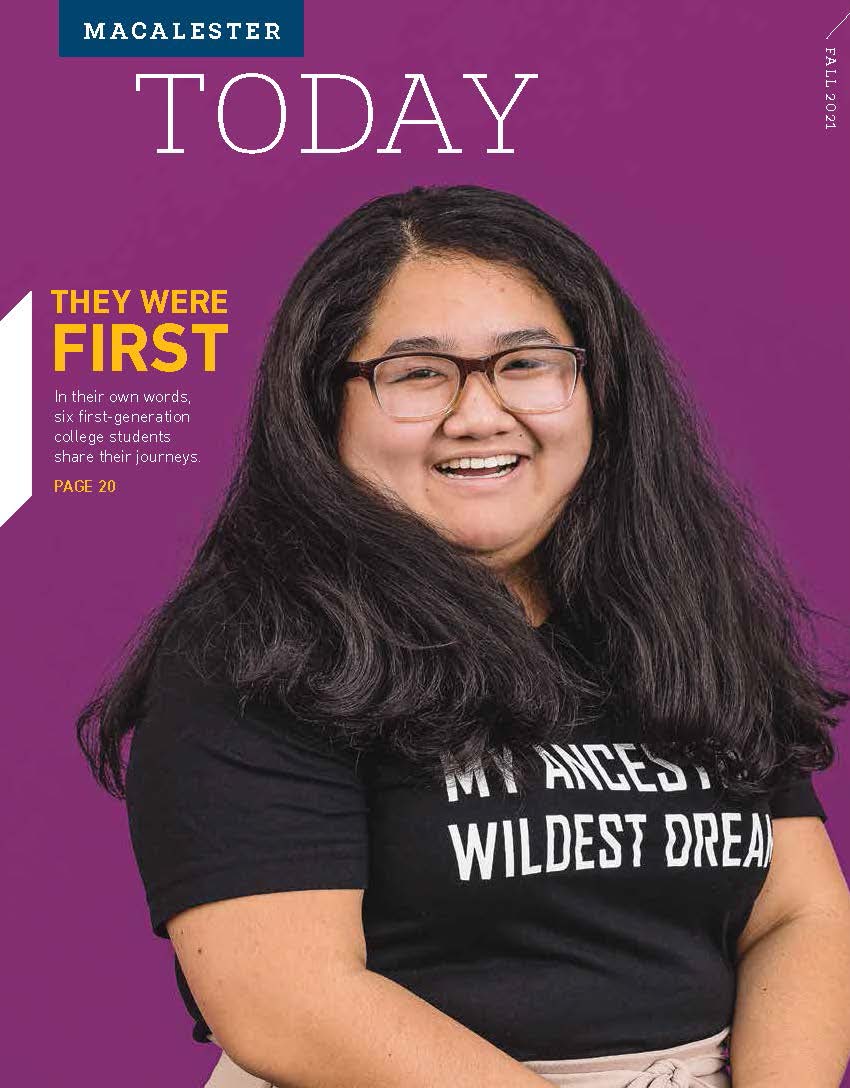
By Dawn Araujo-Hawkins / Photo by Akilah Townsend
For a long time, Tani Prell ’13 struggled to feel like she belonged anywhere. Her parents were sixteen and eighteen when she was born, and Prell, who is biracial, was raised by her mother’s white parents in a suburb of Chicago. She’s never had a relationship with her mother and has only recently gotten to know her father.
And then there was school.
Before college, Prell’s entire education took place at two conservative Lutheran schools. Yet, even as a young adolescent, she often felt out of step with the version of religion these schools presented. She had questions: Why is Eve to blame for everything? What is the role of free will? But her schools did not encourage questions, so Prell saved hers for her grandmother, an Italian Catholic by birth who was also a spiritual questioner.
In middle school, Prell made a life-changing discovery when it dawned on her that the parts of the Bible that she connected to the most were also part of a thriving religion. “As soon as I found out about Judaism, I was like, ‘This is it. This is who I am,’” she says.
She loved Judaism’s openness, the fact that asking questions was at the heart of the religion. It felt like the exact opposite of what she was experiencing at school and church. So she started studying Judaism in her downtime.
Judaism also helped connect Prell to her Blackness—a process that she had largely been trying to work out on her own. When she sang Jewish prayers, she would often enter into a meditative state that made her feel connected to her Black ancestors, and she was elated to discover that ancestral connection was a part of many Jewish practices.
At Macalester, Prell coupled her independent study of Judaism with formal coursework, which further cemented her desire to become Jewish. “I went into Macalester thinking I had a really critical framework through which I learned and understood religion,” says Prell, who majored in creative writing and minored in philosophy and religious studies. “Macalester expanded my thinking more than I could have ever imagined.”
Prell planned to start the official, yearlong conversion process after graduation, but delayed her plans by a year to take on a Teach for America position. But in 2015 Prell converted to Judaism, and she hasn’t looked back.
In February, Prell started her dream job as the Chicago director of 18Doors, an organization that helps people in interfaith relationships engage meaningfully in Jewish life. By supporting people as they explore the myriad ways they can integrate Jewish values into their lives, Prell is helping them to expand ideas of what it can mean to be Jewish.
“I think because I struggled so much to feel like I belonged—culturally I didn’t belong, and religiously I was never aligned with the institutions I was a part of—it just makes sense that the career that I would find is all about creating belonging for people,” she says.
Prell explains that her Judaism manifests in two ways: the internal and the external. Internally, Judaism is her calm in the chaos of the world. She especially loves the song Oseh Shalom, a prayer for peace. “Even when I didn’t know Hebrew yet, it grounded me the first time I heard it,” she says.
Externally, Prell’s Judaism is about creating spaces of belonging and fostering tikkun olam, the Jewish concept of repairing the world.
In her spare time, Prell offers antiracism education and consulting for local and national Jewish organizations, after her master’s degree in Jewish professional studies included research on antiracism in Jewish spaces. She also serves on the Union for Reform Judaism’s North American Board of Trustees, and helps guide the organization’s diversity, equity, and inclusion work.
At times, being an advocate for inclusion can be emotionally draining, but Prell says it’s Judaism itself that sustains her. “One of the things I love most about Judaism is that it has a moment of pause and reflection built into it with Shabbat,” she explains. “I take Shabbat as my moment to pour back into myself so that I have the capacity for sustained justice work.”
In 2018, Prell was selected for the Union for Reform Judaism’s leadership development program for Jews of color, which helped her to cultivate a network of people she can relate to on a new level. It’s a growing demographic—a 2021 Pew Research Center report shows that 15 percent of Jews under thirty identify as people of color.
“So many times, I’m in white Jewish spaces, or spaces with other people of color,” she says. “Being in spaces with Jews of color is a merging of my worlds. It is an exhale. We have a shared experience of navigating what it means to be Jewish in America, while also navigating racist systems in America as Black, Indigenous, and people of color.”
Jews of color historically have been omitted from the narrative of American Judaism. But there are people of color living deeply Jewish lives, she says, and they deserve to have their stories told, too: “The Jewish present and future is multiracial.”
Dawn Araujo-Hawkins is a religion journalist based in Kansas City, Missouri.
November 17 2021
Back to top





